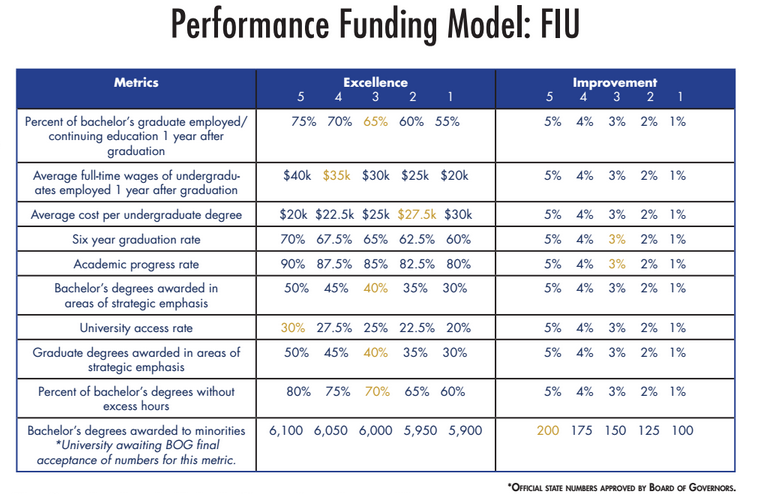Madison Fantozzi/News Director
President Mark B. Rosenberg left the Feb. 10 town hall at Biscayne Bay Campus with some questions to answer: when will the University see more faculty, more advisors, more courses and new academic programs at BBC?
Rosenberg said the University is always thinking of new degree programs, “but if they’re not linked to a need in today’s workforce, it will be difficult to push through.”
This is in line with the new performance funding model and its metrics set forth by the Board of Governors.
Most of the topics in Monday’s meeting circled back to a discussion on these metrics, with Rosenberg addressing both student and faculty concerns with the reality that future funding is undetermined.
However, Rosenberg said the University is going to be “okay.”
“We’re going to do better than okay,” Rosenberg said. “I want the most money we can get.”
Although the system still needs approval by the state legislature, Rosenberg thinks it will determine the University’s direction for the next few years.
“What the heck are we doing here?” Rosenberg said. “What we do here will be determined by the metrics outlined by the Board of Governors.”
“What the heck are we doing here?” Rosenberg said. “What we do here will be determined by the metrics outlined by the Board of Governors.”
The model includes eight measures common to all Florida state universities: employment rate, wages, the cost of degree, graduation rate, grade point average, the number of Pell-grant recipients, the number of bachelor’s degrees in STEM and the number of graduate degrees in STEM.
Two additional measures unique to each university make up the 10-metric system. For FIU, these measures are the percent of bachelor’s degrees without excess hours and the number of bachelor’s degrees awarded to minorities.
Universities can earn up to five points in each category. Any university that scores below 26 points on the 50-point scale will lose 3 percent of its funding. In the case that all universities score a 26 or above, the three lowest scoring schools will lose 1 percent of their budgets.
The chart above shows how many points the University will receive in each respective category determined by the Board of Governors.
Rosenberg said he wants the University to excel in all 10 areas, but there may be some give and take.
“We’re spending a lot of time trying to figure out how to lower the average cost of the undergraduate degree,” Rosenberg said.
But Chief Financial Officer Kenneth Jessell said the University has to figure out how to offer cheaper degrees without compromising quality.
“If you’re not concerned with quality, any numbers guy can find a way to lower the cost,” Jessell said. “But we’re not going to lower the cost to the point of deviating from the quality of education.”
The University is eligible for two points in this category, with the average cost per undergraduate at $26,730.
While Rosenberg joked that the performance funding model “isn’t something invented on the fifth floor,” he said the University is working to improve itself based on these metrics.
In terms of excess hours, this could mean better advising options; and for employment and wages, this could mean offering more internships and guidance in career placement.
“I want to own this process,” Rosenberg said. “If we don’t, chances are we won’t get funding.”
Deans from respective BBC colleges offered suggestions.
Dean Mike Hampton of the School of Hospitality and Tourism Management noted the school’s thousand-hour job and 300-hour internship graduation requirement for its students.
“We work with the industry and provide support for our students,” Hampton said. “We help increase the students’ compensations so that when they graduate they are making that higher wage.”
“It’s more than just 120 hours of courses,” he said. “It’s about planning, support and resources.”
Dean David Klock of the College of Business proposed more faculty and Associate Dean Allan Richards of the School of Journalism and Mass Communication presented a need for more advisors.
Rosenberg said he cannot promise any more resources, however.
“Resources are what they are and I can’t promise one more dollar,” Rosenberg said.
“Resources are what they are and I can’t promise one more dollar,” he said.
The budget sits at $430 million for academic programs.
Rosenberg did promise, however, that tuition will not go up this academic year. But even that sliver of good news has its share of consequences.
“Maintaining tuition now could mean a much lower acceptance rate in the future,” Rosenberg said.
For a university that values community access and fosters an urban mission, this is considered a difficult trade off.
The University is eligible for the full five points for its access rate, which is determined by the percent of undergraduates with a Pell Grant.
FIU does not rank in excellence for its graduation rate nor its academic progress rate. Instead, BOG denotes annual improvement — both at 3 percent annually.
“To drive graduation rates up, we would have to drive the acceptance rate down,” Rosenberg said. “Maybe we don’t recruit from certain high schools.”
Rosenberg said the University is studying the consequences of maintaining or shutting down access. The University could lose points in an area where it currently excels.
While the system presents challenges for the University, Rosenberg said he can’t disagree with the metrics.
“It will only make us better,” Rosenberg said.
– madison.fantozzi@fiusm.com






Be the first to comment on "Rosenberg not content with being ‘okay’"